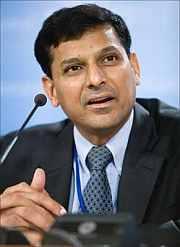 | « Back to article | Print this article |
While the quality of regulation and governance is a key factor to rebuild business confidence in India, the deficiencies in these areas are even more alarming than the inadequacies of the country's physical infrastructure, Raghuram G Rajan, well-known for his critique on the American economic and financial crisis, said on Saturday. He attributed the present state of affairs to what he says the government does too much of what it should not do and too little of what it should do.
He attributed the present state of affairs to what he says the government does too much of what it should not do and too little of what it should do.
As an immediate prescription to set things in the right direction, Rajan calls for a complete relook at the public sector, including the breaking up of monopolies like Coal India Limited, while giving a level-playing field to the private sector.
Addressing the graduation ceremony of Indian School of Business (ISB) on the theme whether the Government in India is performing its appropriate role, he said: "Even as the world becomes more competitive, India's star has dimmed in the last few months, as our governance is besmirched by corruption scandals and our macro economic health has deteriorated."
Rajan, who is also currently an economic adviser to the Prime Minister of India, was critical of the recent government actions such as the change in tax laws in the light of the Supreme Court judgement on the Vodafone case. A government that changes the law retrospectively at will to fit its interpretation introduces tremendous uncertainty into business decisions, and it sets itself outside the law, according to him.
What is the point of having an independent judiciary to interpret the law and adjudicate dispute between government and business if the government has no need to obey it? he asked while saying that the country had missed a golden opportunity to show its respect for the rule of law. That is far more damaging than any tax revenue it could obtain by being capricious, he said.
Fixing the public sector has to come back on the table as a matter of urgency with more radical solutions like breaking them up if they are monopolies, strengthening corporate governance and oversight and returning these firms to full broad-based ownership through a public offering.
State ownership in many areas no longer serves the public interest and even hurts public sector firms, said Rajan, who is Eric J Gleacher Distinguished Service professor of Finance at the University of Chicago's Booth School of Business.
Unfortunately, the private sector has not earned the trust of the broader public, so it is hard to make a strong and persuasive case for change to the voters, he said.
"You have the capacity to make all this possible. But first you have to expand public trust in the private sector by the way you conduct business, increasing your market share by building a better, higher quality, cheaper product rather than by securing under priced public resource through underhand means or inflicting a government protected monopoly on your customers," he told students.
Image: Raghuram G Rajan